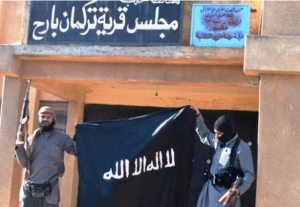The Islamic State of Iraq and Syria (ISIS) has imposed 'Zakat' tax on merchants and industrialists in the areas under its control in the north-eastern countryside of Aleppo.
The Syrian Observatory for Human Rights said ISIS "has forced the merchants and industrialists to pay 2.5% of each sale."
According to the Observatory, the merchants and industrialists told ISIS that they are paying money to the poor families, but ISIS responded that those families should visit the Zakat Chamber "so that their situation is studied and they are given Zakat if they deserve to. The money paid to the poor without reference to the Zakat Chamber is an act of charity, but it doesn’t exempt traders from paying to the Zakat Chamber," ISIS reportedly said.
ISIS distributed sums of money to a number of poor families a few weeks ago in the city of Raqqa and told the people that this money is 'Zakat' collected from the rich of the city.
Furthermore, al-Aan TV said in a report that Zakat was imposed on vegetables and fuel traders. In addition, ISIS has specified the prices for the purchase, sale and rental of kiosks (small buildings made of tin).
One of the traders told Akhbar al-Aan that "ISIS has imposed different fines and conditions on a few small traders in Minbij. ISIS has built a market for vegetables in the public arena in the city, and obliged all of us to work in this market. Now each vegetable seller is forced to pay a monthly rent of SYP 3,500."
"After destroying the parks and modifying the landscape of the city, ISIS began to build "kiosks" and forced all those who wish to hire one to pay seven thousand Syrian pounds per month, while those who want to buy one must pay 60 thousand Syrian pounds", the seller added.
No one was exempt from the imposition of fines, said Abu Amin.
"ISIS has imposed Zakat on all the shops. The amount ranges between SYP 10,000 and 80,000 depending on the type and size of the store. In addition, they forced the fuel sellers to pay 200 Syrian Pounds for each barrel that enters the oil market in Minbij, though this oil is bought from ISIS fuel traders in Raqqa and Deir-ez-Zor," he said.
Translated and edited by The Syrian Observer


